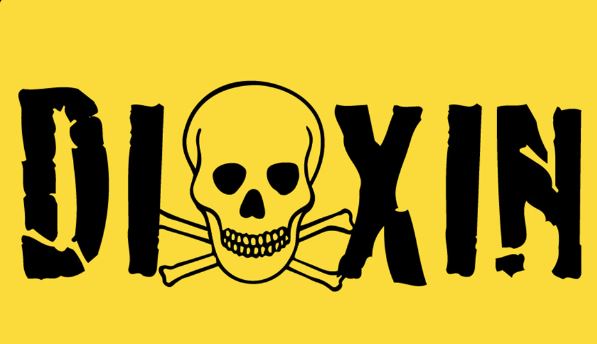This article comes from “citizens.news”
A massive, dark plume hovered menacingly over Palestine, Ohio, on Monday, February 6. This plume comes from a series of “controlled explosions” that occurred after a massive train derailment by Norfolk Southern Railroad.
In order to clear the tracks and prevent explosions, the state ordered a “controlled release” of toxic vinyl chloride from the tankers. These “controlled explosions” were approved by Ohio Governor Mike DeWine. The official story is that the government feared that the chemicals would explode uncontrollably, so they ordered the chemicals be strategically released from five derailed tanker cars and then burned in pits. However, the derailment and the explosions released one of the most toxic substances known to man: dioxins.
Massive dioxin plume could warrant a ghost town scenario
The government and the media fail to mention that these “controlled explosions” are both an environmental and human health disaster that could warrant a permanent evacuation of the area, leading to a potential ghost town scenario. When polyvinyl chloride is burned, it creates a pervasive poison called dioxin. Dioxins are not some benign vapor or campfire smoke that can be inhaled without biological consequence. In fact, according to EPA standards, being exposed to just 1/32 millionth of a gram of dioxins is the maximum lifetime allowable exposure to this biological poison! However, there are no reports of dioxin testing being conducted by the industry, or local, state, or federal officials. The Environmental Protection Agency (EPA) is currently allowing residents to return to their homes and claiming it’s safe to do so.
Neil Donahue, professor of chemistry at Carnegie Mellon, said he worries that the controlled explosions have unleashed dioxins, which are created from burning chlorinated carbon materials. “Vinyl chloride is bad, dioxins are worse as carcinogens and that comes from burning,” Donahue said.
The EPA’s reference dose for dioxin is 0.000,000,001 milligrams per kilogram of body weight per day (mg/kg/day). This “reference dose” is the highest amount EPA scientists believe an individual can regularly consume without incurring any disease. Peter Montague, author of Rachel’s Hazardous Waste News, gave a summary of the toxicity of dioxin:
How can we express this in terms that people can grasp? Let’s compare it to one single aspirin tablet. One aspirin tablet weighs 5 grains (or 325 milligrams, or 325 trillion femtograms), so to express one “safe” lifetime dose of 2,3,7,8-TCDD, you would take a single aspirin tablet and divide it into 32 million (actually 32,172,218) minuscule pieces. Then one of those tiny pieces would represent one “safe” lifetime dose of 2,3,7,8-TCDD.
This dioxin disaster will be felt for years to come
Dioxins are degradation byproducts of chlorine-based chemicals. Whenever a chlorinated compound is burned, dioxins are created. The plastics industry, which uses polyvinyl chloride, is typically the top polluter. Some of the most serious sources of dioxins include house fires, chemical spills, and trash incineration. Any manufacturing process that involves chlorine (like paper bleaching) also releases dioxins. Feminine products that have been bleached may cause toxic shock syndrome, because of dioxins. Dioxins are also found in trace amounts in some herbicides and wood preservatives.
Dioxin was the principal cancer-causing compound Agent Orange, used in Vietnam. Dioxin also goes by the abbreviation 2,3,7,8 and is sometimes called Dibenzofurans or TCDD. Polychlorinated biphenyls (PCBs) are a form of dioxins. These highly carcinogenic compounds were formerly used in industrial and consumer products, but their production was banned in the United States by the Toxic Substances Control Act in 1979 and internationally at the Stockholm Convention on Persistent Organic Pollutants in 2001.
Dioxins are so toxic they caused a complete evacuation of Times Beach, Missouri in 1983. Times Beach is just 17 miles southwest of St. Louis and 2 miles east of Eureka, Missouri. The city was unincorporated and abandoned because of civilian exposure to dioxin contamination from industrial sources. The area was never re-inhabited, but in 2001, the EPA took the site off its Superfund list and a state park was opened on a 419-acre site there.
These dioxins are not something that drifts away and degrades; they are not something that can be forgotten tomorrow. Chemically, dioxins have a double benzene ring structure, making them extremely durable and persistent. Studies show that dioxins build up in the food chain in lipids and cause lipid metabolism disorders. They are also bioactive, will disrupt hormones, and pass through breast milk.
The dioxins created from this “controlled burn” will pollute the soil and water for many years to come. As the plume rolls across Pennsylvania and New York State, large population centers will be acutely exposed to one of the most toxic man-made substances. Cancer clusters, hormonal disorders, and further immune depletion will be the inevitable result of this tragedy and the string of hasty decisions and cover-ups that came thereafter.
Sources include:
